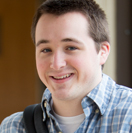 A Binghamton University undergraduate’s research could lead to earlier diagnoses for patients suffering from vision loss.
A Binghamton University undergraduate’s research could lead to earlier diagnoses for patients suffering from vision loss.
Ronald Miller, a junior majoring in bioengineering, has interned for two summers with Daniel Tso at SUNY Upstate Medical Center, working with specialized cameras to measure activity level in the human retina, a light-sensitive layer of tissue that lines the inner surface of the eye. “Over the summer I worked in a vision lab in Upstate Medical Center, and we’d image the retinas of different students and volunteers, and myself, too,” Miller says. “Right now we’re trying to quantify the signal and measure what it looks like consistently in a healthy person.”
Being able to measure signals in a healthy person, Miller says, could allow for easier and earlier detection of retinal abnormalities.
“We tried to quantify that signal in healthy individuals so we can see what indicates certain retinal diseases like retinitis pigmentosa, glaucoma and macular degeneration,” he says. “A lot of times you don’t know you have one of these conditions until you have really big vision deficits, and by then it’s really difficult to correct or treat.”
Miller uses a laser to stimulate the retina, shining the light for less than a second and then recording activity level for the following five seconds. The lasers allow Miller to use differently shaped stimuli and see the resulting effects on infrared images of the retina.
Miller also works with bioengineer Jacques Beaumont, a visiting professor at Upstate Medical University who was until recently a Binghamton faculty member. They plan to re-create and eventually improve on a model of the visual cortex initially developed at New York University.
“I want to try to improve upon the model that they created, make it more biologically accurate,” Miller explains. “Eventually, if the model is totally accurate, you could test the effects of various drugs.”
Beaumont and Miller plan to continue working together this summer, when Miller will have a chance to put his training to use on a software development project. “I expect a significant contribution when he will be able to run simulations in parallel with his experiments,” Beaumont says.
Beaumont says Miller is developing an expertise on vision. “I hope he will continue in his future career applying modeling and experiments to develop an understanding of the molecular mechanisms of various forms of blindness,” Beaumont says.
Miller, a Syracuse native, is also an event coordinator for the Student Volunteer Center on campus. “It’s fun, I get to meet people and it’s cool to see what’s around the community because a lot of people need help with events and students don’t know about it,” Miller says.
He plans to pursue a doctorate or medical degree. His grandfather, who was a pulmonary specialist, inspired him to enter the medical field.
“I want to pursue a career in medicine because I want to be able to improve people’s lives,” Miller says, “possibly by inventing a biomedical device or devising some form of early detection or treatment plan.”







